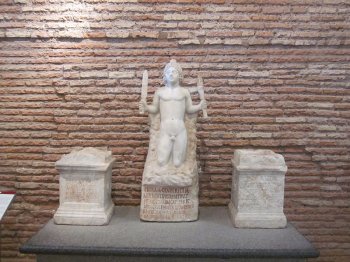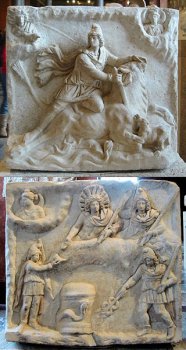It's spelled Hislop.
Alexander Hislop was a Scottish Presbyterian minister and in 1853 produced a pamphlet which in 1858 was expanded to a book. Its theme was to link the religion of ancient Babylon with that of the Catholic Church. It was full of footnotes and sketches to show extensive similarities and which gave an impression of serious scholarship. However there are two major problems with his thesis:
Firstly his claims turned out to be bogus. He simply invented information about Babylonia which doesn’t exist. Likewise his diagrams and sketches were just a product of his imagination,
Secondly he made links without any causal evidence, avoiding more realistic causal links. For example he claimed that the Babylonians offered round wafers to their God, the same a Catholic hosts at the Catholic Mass. His Babylonian claim was false, he showed no link as to how the Catholic Church took this from Babylon, and ignored the obvious point that the Matzo bread which Jesus broke at the last supper was flat round unleavened bread. Also
manna is described as round (Ex 16:14) and like wafers (Ex16:31)
As Wikipedia says:
It has been recognized by scholars as discredited and has been called a "tribute to historical inaccuracy and know-nothing religious bigotry" with "shoddy scholarship, blatant dishonesty" and a "nonsensical thesis".
http://en.wikipedia.org/wiki/The_Two_Babylons
An Evangelical Minister, Ralph Woodrow, produced a book based on Hislop's called
Babylon Mystery Religion, which sold widely and was translated into several languages. He says that few challenged his book. One who did was Scott Klemm, a high school history teacher in Southern California. Woodrow writes:
“Being a Christian and appreciating other things I had written, he began to show me evidence that Hislop was not a reliable historian. As a result I realised that I needed to go though Hislop's work, my basic source, and prayerfully check it out.
As I did this it became clear – Hislop's “history” was often only mythology. Even though some myths may sometimes reflect events that actually happened, an arbitrary piecing together of ancient myths cannot provide a sound basis for history.”
Woodrow went on the investigate Hislop's claims consulting many reliable sources. He wrote another book called
The Babylonian Connection? in which he demolished Hislop's claims.
On his web site (
http://www.ralphwoodrow.org/books/pages/babylon-mystery.html) he gives some examples and comments:
It is amazing how unsubstantiated teachings like these circulate—and are believed. One can go to any library, check any history book about ancient Babylon, none of these things will be found. They are not historically accurate, but are based on an arbitrary piecing together of bits and pieces of mythology.
Some people believe in pursuing the truth.
Woodrow is not an apologist for the Catholic Church. In his book, despite demolishing Hislop's claims, he spends one chapter criticising the Catholic Church for what he calls "excess baggage", He says
"It would be more appropriate to say that "some" things have been taught in the Roman Catholic Church that "dishonour" God....."
In the quote from Wikipedia I gave there are two footnotes. One points to a review of "The Babylon Connection?" who says:
The Babylon Connection? is a devastating critique of Hislop and his many imitators. Almost from the first page, the shoddy scholarship, blatant dishonesty, and personal prejudices of Alexander Hislop are quite evident. By the end of the first chapter, none except those suffering from “black helicopters over America” paranoia could possibly view Hislop as anything but a crackpot and a fraud. Woodrow presses on, however, and in painstaking detail demonstrates Hislop’s lack of scholarly integrity. As one who was formerly believed Hislop to be a credible source, Woodrow understands the mindset of those fooled by this belief system and he leaves their delusions in tatters. When it is over, nothing of Hislop’s rhetorical edifice is left standing.
(
http://labarum.net/)
BTW - you were not
born a Catholic (unless you mean "born again" a Catholic. Your claimed priestly training doesn't seem to have taught you much.




